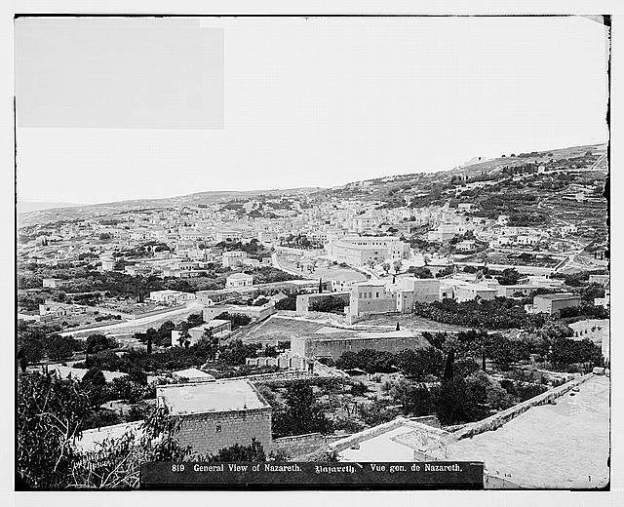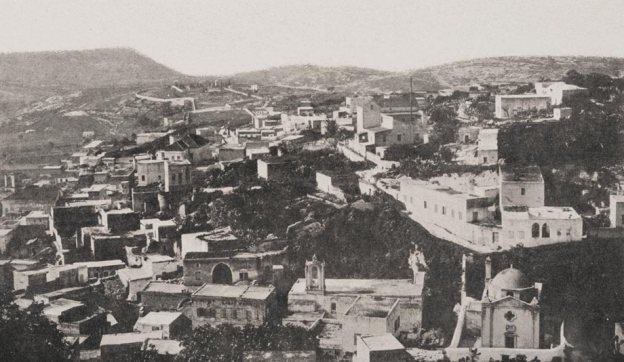The following is post number 24 and the final post in my series, “The Nativity Through Abrahamic Literature”. This post covers the entire story of the nativity as it is found in the History of al-Tabari 724-729. This post is taken from The History of al-Tabari Volume 4: The Ancient Kingdoms Translated by Moshe Perlmann.
Mary and her cousin Joseph, the son of Jacob, were attached to the service of the sanctuary. It is said that when Mary’s water and Joseph’s water ran out, each of them would take the pitcher to go to the cave where they used to draw the water they liked. They would fill the pitcher, and then return to the sanctuary. When the day arrived on which the angel Gabriel met her-it was the longest and hottest day of the year-the water ran out. She said, “O Joseph, should we not go fetch water?” He said, “I have more than enough for the day, enough to last until tomorrow.” She then said, “By God, I have no water left.” She took her pitcher and went alone. She entered the cave, and found Gabriel there-God made him appear to her as a shapely human-and he said to her, “O Mary, God has sent me to you to give you a boy most pure.” At this she exclaimed, “I take refuge in the All Merciful from you, if you fear God!” (She had thought that he was a man, a mortal.) But he said, “I am but a messenger come from your Lord.” She then said, “How shall I, whom no mortal has touched, have a son; neither have I been unchaste?” He replied, “Even so. The Lord has said, ‘Easy is that for Me, and We may appoint him a sign unto men and a mercy from Us; it is a thing decreed.”‘i
That is, God has decreed that it is so. When the angel spoke thus, she submitted to the divine decree, and he breathed into her bosom. Then he left her, and she filled her pitcher.
According to Muhammad b. Sahl b. ‘Askar al-Bukhari- Isma`il b. ‘Abd al-Karim-`Abd al -Samad b. Ma`gil, the son of the brother of Wahb-Wahb: When God sent Gabriel to Mary, he appeared to her as a shapely man. She then said , “I take refuge in the All Merciful from you , if you fear God!” Then he breathed into the opening of her garment ; the breath reached her womb, and she conceived Jesus . A relative of hers was with her, Joseph the carpenter by name . Both were going to the Temple which is near Mount Zion . At the time, that Temple was one of their greatest sanctuaries . Mary and Joseph were then serving at that Temple, and service there was a great honor. They were both attending to the sanctuary , perfuming, sweeping, cleaning, and whatever was necessary . They were the most eager worshipers of the age.
Joseph was the first to censure Mary’s pregnancy. He was distressed by what he saw, horrified , and knew not what to ascribe it to. When Joseph was ready to accuse her, he remembered that she was pious and innocent, that she had never absented herself from him. When he wanted to exonerate her, he observed what had happened to her. When this began to oppress him, he spoke to her. First he said to her, “A thought has occurred to me about you, and I have tried hard to still and conceal it; but it has overcome me, and I have decided to talk about it to calm my heart .” She said, ” Say a pleasant word;” whereupon he replied, “That is all I wanted to say; tell me, does a field grow without a seed? ” She replied, “Yes.” He said, “Does a tree grow without rain striking it?” She said, “Yes.” “Can there be a child without intercourse ?” he asked. “Yes,” she replied, “Do you not know that God made the field sprout on the day of creation without any seed; rather, the seed was from the field which God made sprout without seed. Do you not know that God made the tree grow without the rain, and that with the same power he produced the rain for the life of the tree, after he had created each of the two separate? Or do you think God could not make the tree grow without using water upon it? Or, were it not for the water He could not make the tree grow?”
Joseph said to her, “I do not say that. I know that it is within God’s power to act as it pleases Him. He only has to say ‘Be, and it is.”‘ii Mary then said to him, “Do you not know that God created Adam and his wife without male or female?” “Certainly,” he replied. When she told him that, it occurred to him that what was happening to her was a divine thing, and that he should not ask her about it since he felt she was concealing it. Thereafter Joseph took care of the Temple service, and spared Mary all the work she used to perform there. He did so because he saw how delicate her body was, the yellowing of her complexion, the dark hue of her face, the growth of her abdomen, her weakness, the intent gaze . Previously, Mary was different. When the time of her confinement was close, God revealed to her, “Leave the land of your people, for if they seize you, they will revile you and kill your child.”
She came to her sister who was then pregnant and to whom the birth of the Baptist had been announced. When the two met, the Baptist’s mother felt that her child was bowing within her in recognition of Jesus.iii Joseph then carried Mary to Egypt on a donkey. During the entire trip there was nothing between her and the saddle.iv Joseph traveled with her, and when they were close to Egypt, far from the land of her people, birth-pangs seized Mary which forced her to lie on the haversack of the donkey under a palm tree. It was winter, and Mary’s delivery was difficult. When in pain, she took refuge under the palm tree. Angels embraced and surrounded her in ranks. When she gave birth and was in sorrow, she was told, “No, do not sorrow; see, your Lord has set below you a rivulet. Shake also to yourself the palm trunk, and there shall come tumbling upon you dates, fresh and ripe. Eat therefore, and drink, and be comforted; and if you should see any mortal, say, ‘I have vowed to the All Merciful a fast, and today I will not speak to any man. “‘v
The dates came tumbling upon her, though it was wintertime. Wherever idols were worshiped, the idols were toppled and thrown upside down. Devils took fright but remained unaware of the cause. They rushed to Iblis,vi who was on his throne in the deep green sea like the throne that had been upon the water, and he veiled himself in imitation of the veils of light before the All Merciful. The devils came to him while six hours of daylight were remained. When Iblis saw their congregation he was frightened, for since he had dispersed them he had never seen all of them together. He had seen them in small groups only. He questioned them, and they told him that something had happened upon earth, and that the idols were turned upside down. These idols were most conducive to human perdition . “We used to enter their insides, address the humans,and contrive to direct them, while the people thought that the idols were speaking to them. When this event occurred, however, it detracted from the stature of the idols, humbling and humiliating them. We fear humans will not worship them anymore. Know, that we did not come to you before crossing land and sea, and doing whatever we could, but we are still utterly ignorant about the cause of what happened.”
Iblis told them, “Truly, this is a grave matter. I know it was concealed from me. Stay here.” He flew away and was absent for three hours during which time he passed by the place where Jesus was born. When he saw the angels surrounding the spot, he realized that this was where the event had occurred. Iblis wanted to approach it from above. But the angels’ heads and shoulders that reached up to heaven were over it. He then tried to reach it from under the earth but the angels’ feet were firmly entrenched below-lower than Iblis expected. Thereupon he tried to enter among them, but they shoved him away. Then he returned to his associates, and said to them, “I come to you after crossing the whole earth, east and west, land and sea, the four quarters of the world, and the upper sphere. I managed to do that in three hours.” Then informing them about the birth of Christ, he said to them, “It was concealed from me. No female womb has ever conceived without my knowledge, and none has given birth without my presence . I am more apt to mislead the newborn than he is to find right guidance. No prophet was ever more calamitous to me and to you than this one.”
That night a group set out to go to Christ, urged by the rise of an unknown star. They had been discussing that the rise of that star was one of the signs of the birth of a child, as indicated in the Book of Daniel . They set out on the road to reach the newborn, and carried gold and frankincense and myrrh. They passed by the king of Palestine. He asked them where they were bound, and they told him . He then asked, “Why of all things this gold, frankincense, and myrrh that you bring as a gift for him ?” They replied, “They befit him because gold is the noblest possession, and this prophet is the noblest of his age; myrrh heals wound and fracture , and similarly, this prophet will be raised by God to heaven, uniquely in his time.” Upon hearing this, the king resolved to kill the child. He told them, “Go, and when you have found him, bring me word, and I shall follow in your footsteps .” They departed, and delivered the gifts to Mary. They wanted to return to the king to bring him word of the place of Jesus, but an angel met them , saying, “Do not return to him, and do not bring him word of the child’s place, for the king wanted to learn of it only to slay the child.” Thus they departed by another road.’vii
Notes
iQuran 19:17-21
iiA frequent locution in the Qur’an. See for example 2:111; 3:52.
iiiLuke 1, especially verses 41-44.
ivMatt 2:13-15.
vQuran 19:24-27
viSatan
viiMatt 3










